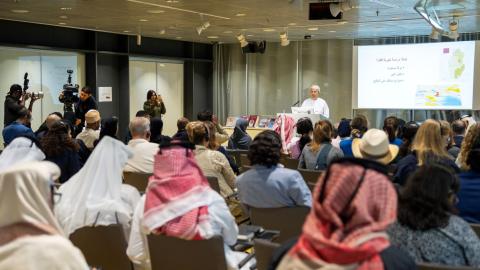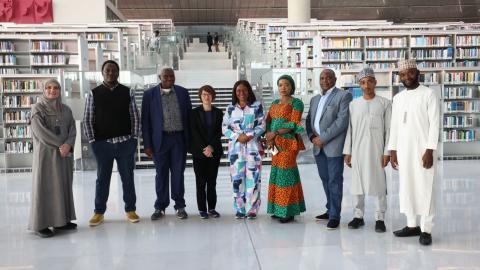
The open access movement is growing fast—and shaking up the scholarly publishing industry in a big way.
Open access aims to return academic publishing to its original intention of spreading knowledge and sharing research without the barriers of high publishing, distribution and licensing costs. Open access journals provide increased visibility for researchers and their work, and give students or other researchers easy access to the information they need.
Qatar National Library is at the forefront of the open access movement in Qatar, providing multiple avenues for Qatar-based authors to fund the publication of their research. Through the Open Access Author Fund, the Library directly pays the publishing costs on behalf of the researcher. The Library also has Read and Publish agreements with many major publishers, such as Elsevier, Springer Nature, Wiley, Taylor and Francis, and IEEE, giving authors a fast, easy route to funding.
Both options are available for students, faculty, researchers and staff from any institute of higher education or non-profit research institute within Qatar. The Library has funded nearly 1,000 open access articles since 2017, increasing the reach and impact of Qatar’s research output.
Dr. Tariq Abbas, a pediatric urologist at Sidra Medical and Research Center, used the Open Access Author Fund to publish his findings linked to research projects related to birth defects in children called hypospadias. The nature of his work covers a wide spectrum, including genetic makeup, antenatal diagnosis, surgical management, animal experiments and artificial intelligence.
“I used to publish my work in non-open access journals. This made it incredibly difficult for some of our intended audience to hear about our results,” says Dr. Abbas.
The Library’s Open Access team has also made sure to streamline the process for applying for funding. Each funding request is evaluated to ensure the targeted publication aligns with the Library’s open access criteria, no other funding sources are available and the article has been approved for publication during the current year.
Dr. Abbas says about getting access to funding: “The process is straightforward and clear and the team is helpful and always available. Working with the Library’s Open Access Author Fund has significantly increased the visibility of our work and has resulted in higher download and citation rates.”
“I was very satisfied and happy with the promptness, helpfulness and guidance I received from the Library when I dealt with the team on several projects over the past few years. The Library provides a strong foundation of support and help for all researchers in Qatar that can foster outcomes and visibility,” he adds.
The Open Access Author Fund promotes Qatar-based research through open access to scholarly research, and creates and supports a permanent archive of Qatar-based research at the Library. Faiz Ahmed Mohamed Elfaki, Associate Professor of Statistics at Qatar University, has also used the Open Access Author Fund to publicize his research findings.
“My research interest is mainly in survival analysis, mathematical statistics, reliability theory and quality control,” Elfaki says. “Before using the Library’s open access services, I had many difficulties in getting support in terms of funding the research and choosing the right journal in which to publish the article.”
He adds: “Since using the Open Access Author Fund, my research has been viewed and cited a great deal more. I would say it is the best way for members of the research community to get their research published, as they will benefit not only in terms of more citations, but they can get their ideas across to a wider audience. It also enables them to get collaboration to conduct research on a larger scale.”
Dr. Shahab Uddin Khan, Senior Scientist at Hamad Medical Corporation, also used the Open Access Research Fund:
“My main interest is identifying and characterizing the signaling pathways involved in the development of human diseases, especially in cancer, so they can be used as a biomarker for disease detection and management,” he says.
“We were facing difficulties in publishing many of our articles, as traditionally we have had very limited funding for publication. The Open Access team at the Library really made the whole process easy for scientists and the research community in Qatar. We are very thankful for this service.”
“To all scholars in Qatar, I would say, please consider the Open Access Author Fund at the Library. It’s so easy to use and so helpful to get access to funding”, Dr. Khan concluded.
Researchers can find more information and apply for the fund by visiting https://www.qnl.qa/en/researchers/OAQNL
Qatar National Library is also organizing a series of online workshops and events as part of Open Access Week 2020. More information and registrations link can be found on the Library’s website.







